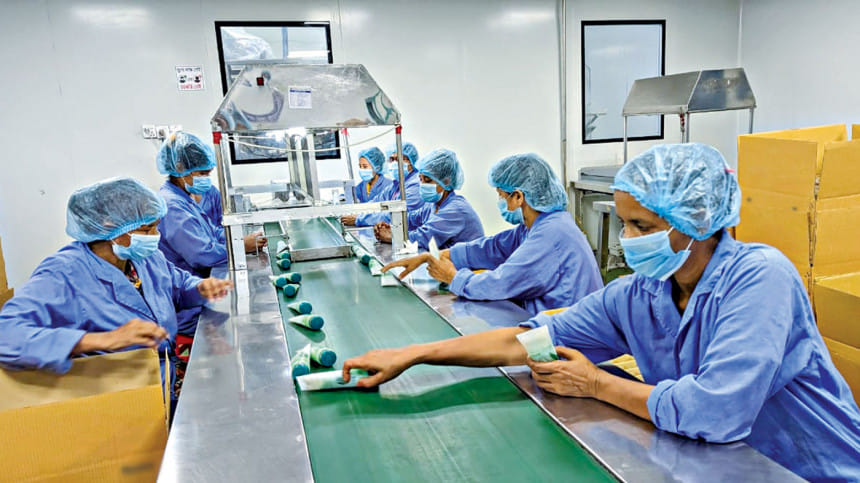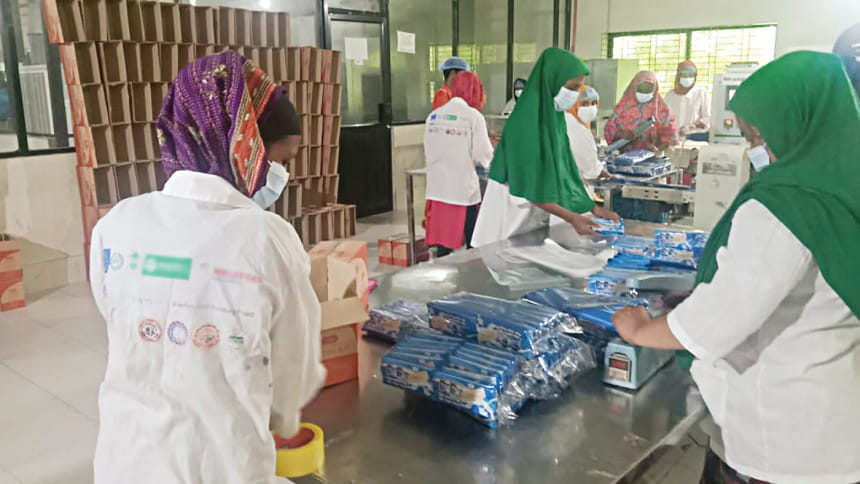BSCIC estate brings solvency to female workers

The Bangladesh Small and Cottage Industries Corporation (BSCIC) established an industrial estate on 26.30 acres of land in the Dapunia area of Jamalpur in 1980 with a view to developing small and medium enterprises and creating jobs.
The estate has turned out to be successful as it has reached most of its core targets. What is more, it has generated jobs, mostly for women, thus making them solvent and empowering them.
According to the office of the Jamalpur BSCIC, there are 82 industrial units located over 197 plots. Of the 1,848 workers employed, 723 are male and 1,125 are female.
The factories manufacture products such as textile and metal items, mustard oil, hair oil, face wash, shampoo, hand wash, glass cleaner, dish wash, baby tissue, cakes, chips, and bread.
Akbar Hossain Samrat, deputy general manager of the BSCIC office in Jamalpur, says women have been given jobs to make them solvent. "We have been working to empower women from the beginning."
"Women are apt and skilled, so they have been engaged in higher proportion in most of the factories."
Marium Khatun, a worker at a factory run by the Ayesha Abed Foundation in the district, said she used to work at a garment factory in Dhaka in the past, but she could not save any money since she had to live in a rented house.
The foundation runs the factory at the estate where women artisans produce garments, home textiles, and other items that are retailed at Aarong, the biggest fashion brand in Bangladesh.

"Here I can work and still can live with my family," said Marium, who has been working at the estate for 10 years.
She saved enough money to buy cows and reared them. She has bought one bigha of arable land using the proceeds from the sales of the cows.
Shaila Rahman, a worker at Raja Food Product, said, "I am happy working in the chips factory."
She earns Tk 10,000 per month.
"I can spend the money for my children's education. My dream is that my children will find jobs after completing their studies."
Laboni Akhtar, a worker at Hemas Consumer Brand Private Ltd, earns Tk 15,000 a month.
"With the money, I can easily run my family," she said. She describes the workplace as congenial.
Md Towhid Khan Shuvo, an assistant officer at the Ayesha Abed Foundation in Jamalpur, said: "All of our workers are women and they are skilled."
Mostak Ahmed, manager of Raja Food Product, said: "Women are better for this kind of task, so we have engaged them more."
Md Kamal Pasha, deputy general manager of Jabed Agro Food Processing Limited, says as the price of all raw materials has gone up, the factory is staring at losses.
"But we have not closed the factory as the livelihood of many female workers is involved."
According to Samrat, all of the plots in the estate were allocated among original entrepreneurs when it was established. Currently, there is no vacant plot.
Of the 82 units, 56 are fully operational, 12 units are closed, and lawsuits are running against eight units.
The BSCIC started its journey in 1960 to develop industrial plots equipped with utility connections and connectivity for SMEs with a view to spurring industrialisation. The state-run agency has 80 industrial estates having 11,922 plots.
Currently, 4,511 factories are operational in the estates and a fifth of them manufacture goods for the export markets, BSCIC data showed.
About 30 per cent of import-substitute products made in the country also come from these estates, which also account for 11 per cent of the country's exports.
The industries in the estates represent garment, poultry, food-processing, jamdani, hosiery, active pharmaceutical ingredients, light engineering and electrical products, plastics, printing, and chemicals sectors. Collectively, they have created more than 850,000 jobs.

 For all latest news, follow The Daily Star's Google News channel.
For all latest news, follow The Daily Star's Google News channel. 



Comments